Artificial intelligence is revolutionizing every area of our lives, and the automotive industry is no exception. CHI Software, as a generative AI development company that has been growing since 2006, knows this better than anyone. Today, one of the most significant advances in the automotive industry is AI vehicle inspection.
AI integration is changing how cars are assessed, making the process faster, more accurate, and more efficient. CHI Software’s developments in this new field include AI-based machine condition monitoring software, which is already helping to monitor the state of a car in real-time, while the vehicle hail scanning system can detect even the slightest external defects in about a minute.
In this article, we will explain how cutting-edge technology is changing traditional practices, covering the benefits of artificial intelligence in inspection, key innovations, and CHI Software’s experience in this field. So, let’s start with the most interesting – how AI transforms vehicle inspections.
Article Highlights:
- AI-based car inspections make use of a wealth of innovations, from identifying scratches with computer vision algorithms to real-time vehicle monitoring with smart sensors;
- It’s more than just damage detection. Algorithms can be used for automating inspection reports, pre-delivery inspections, used car certification, and more;
- Our development experience shows that you can monitor all parts of the vehicle both online and offline after implementing AI;
- We believe that in the future, remote and fully autonomous car inspections have the potential to become the new norm.
Benefits of AI in Car Inspections
Artificial intelligence technology offers advantages that traditional methods cannot match. Thanks to the introduction of smart algorithms, inspections can become more thorough, efficient, and reliable. Below, you can find a detailed answer to the question of how AI transforms vehicle inspections.
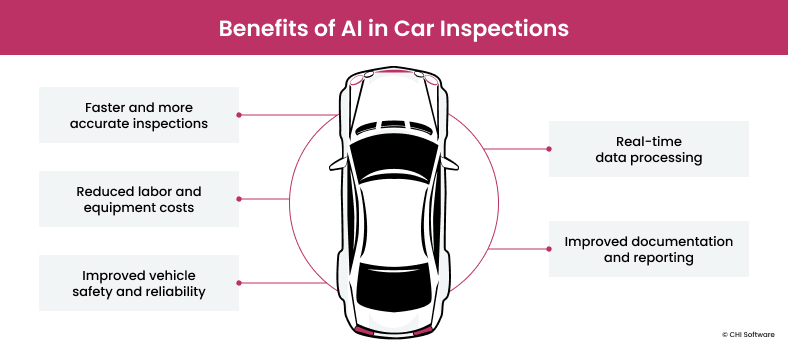
These are the most prominent advantages for businesses implementing AI-based car checks.
Faster and More Accurate Inspections
Artificial intelligence minimizes the human factor in vehicle inspection. Human inspectors may not notice small defects, for example, due to fatigue. In this case, machine learning models and advanced algorithms will do the painstaking work with extreme accuracy to the smallest detail.
AI has many capabilities that are beyond human inspectors. For example, by implementing AI, a company can check the alignment of key components such as wheels, axles, and body panels to ensure they meet manufacturer specifications.
Anomaly Detection with Computer Vision: Enhancing Quality Inspection Across Industries
Read more
Reduced Costs
Another advantage of AI in vehicle inspections is significant cost savings for both businesses and customers.
- The time needed for labor is reduced due to the automation of many processes, resulting in lower costs for inspectors. The changes enable the company to cut the number of inspectors or redirect them to other, more important tasks.
- Equipment and maintenance costs are comparatively lower, as AI systems require less supervision and upgrades than tools and equipment used for manual inspections.
Predictive Maintenance
Predictive maintenance ensures that potential malfunctions are identified early. What does this mean? First and foremost, it is a significant safety improvement. Preventive maintenance saves time, and could even save the car. This approach could reduce the number of unexpected failures during the driving process.
AI vehicle inspections allow you to keep records and quickly analyze past data to provide a complete picture of the vehicle’s condition. Such innovations reduce the number of unnecessary interventions, and maintenance can be performed only when it is needed.
Improved Vehicle Safety and Reliability
- In addition to detecting damage faster, AI can also use machine learning algorithms which continuously learn and adapt after each inspection to create a more reliable inspection process.
- Monitoring systems can detect the most minor problems using image recognition and computer vision algorithms. AI can detect damage that is usually missed during a manual inspection.
- AI inspects all cars to the same exacting standards. And, of course, the inspection staff and car owners have access to a history of all inspections with in-depth details. Reports and other types of feedback are also provided in the shortest possible time, minimizing downtime.
Real-Time Data Processing
AI can process vast amounts of data in real time. Processing includes various readings: sensors, vehicle diagnostics, and image recognition. It’s hard to describe how massive this work is and how much time and effort it would take without AI. The implementation of AI algorithms allows professionals to take immediate action if any problems are detected.
Improved Documentation
AI systems can automatically record and document inspection results. Algorithms can create digital records that can be stored or shared. Improvements to documentation can include:
- Automated data recording: every step of the inspection can be documented in real-time.
- Comprehensive reports: AI systems generate detailed inspection reports. They include diagnostic data, images of defects, accurate sensor readings, and a summary of the overall condition of the vehicle.
- Easy sharing: inspection reports can be shared between departments, teams or other stakeholders.
- Visual documentation: documents are supplemented with high-resolution images or videos.
- Historical data analysis: improved documentation allows professionals to analyze trends over time.
After reviewing the worthwhile benefits of AI in vehicle inspection in the previous sections, let’s talk about the technologies used for automotive diagnostics.
Eager to start your development project? CHI Software is here with a full scope of the required expertise.
Reach out to our team
Technologies Driving AI in Car Inspections
What AI development services are needed for the smooth operation of the vehicle inspection system? Let’s check out the theoretical background so that you can better understand the practical insights from CHI Software a bit later.
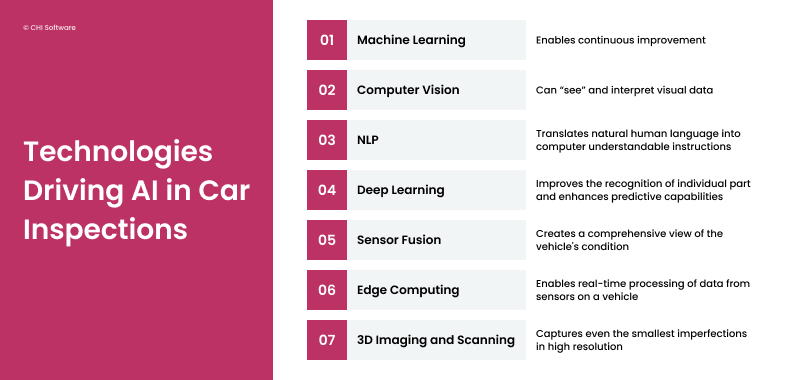
These are the main AI subsets revolutionizing car inspections as we know them.
Computer Vision
Computer vision and image recognition can ‘see’ and interpret visual data, efficiently assessing the cars’ condition. Cameras create detailed images of the car’s exterior and interior, and AI further processes the data to help detect dents, scratches, paint defects, and other issues.
Machine Learning (ML)
Machine learning is an example of the transforming role of AI technology in vehicle inspection because it enables continuous improvement in vehicle analysis and evaluation.
ML models are trained on large datasets containing images of vehicles with different conditions, including dents, scratches, paint issues, etc. The algorithms are better at recognizing the patterns and characteristics of different types of damage after each use. In this way, regardless of the number of inspections, algorithms ensure that each vehicle is inspected thoroughly.
After analyzing previous data and identifying patterns, ML algorithms predict potential problems, increasing the level of safety through proactive maintenance.
Precision or Tradition? Comparing AI and Manual Hail Inspection Techniques
Read more
Deep Learning
Deep learning, a subset of machine learning methods, is based on artificial neural networks. ‘Deep’ refers to the use of multiple layers in the network. They are used in all machine inspection processes.
These models have a wide range of applications. They can be used to improve the recognition of individual parts or to enhance predictive capabilities. Deep learning is based on the analysis of previous cases. It thus enhances each component of the inspection with each successive run. In general, the rule of thumb is the more cases and information you have – the better the subsequent inspections are.
Natural Language Processing (NLP)
NLP algorithms translate natural human language into computer-understandable instructions.
In addition to processing and analyzing feedback about a particular type of service, NLP can easily collect information about any complaints or suggestions from car owners. This approach will increase customer satisfaction, as they can use voice or text to provide the necessary information. Data collection methods will be convenient for the customer and the insurance company or service provider.
Sensor Fusion
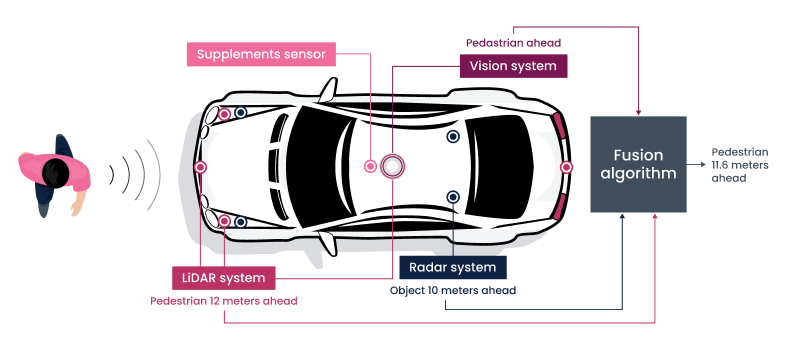
This is the basic scheme of the sensor fusion setup.
Sensor fusion combines data from multiple sensors, such as LiDAR, radar, and cameras, to create a comprehensive view of the vehicle’s condition. Sensor fusion is necessary to identify structural damage, tire wear, or brake performance that a single sensor type may miss.
Edge Computing
Edge computing enables real-time processing of data from sensors (e.g., cameras) on the vehicle, which allows for faster detection of abnormalities. Edge computing enables fault detection even while the car is in use. These algorithms are making the entire AI-based vehicle inspections process faster.
3D Imaging and Scanning
This vehicle inspection technology is the innovation that captures even the smallest imperfections in high resolution. With access to the best quality 3D scans, artificial intelligence algorithms offer even more accurate repair estimates.
AI-Driven Innovations in Vehicle Inspection
It’s incredible what AI-based car inspections can achieve, isn’t it? Well, we’re not going to stop here. We have prepared up-to-date information on using all of these technologies, so let’s get down to it.
| Innovations |
Technologies |
Benefits |
| Comprehensive Vehicle Health Monitoring |
Sensor Fusion, Edge Computing, Computer Vision, Health Index algorithms |
Combines data from multiple sensors; calculates the overall state of the car. |
| Inspection Report Automation |
Machine Learning, NLP |
Generates detailed, human-readable reports. |
| Post-Collision Analysis |
Machine Learning, Deep Learning |
Estimates repair costs based on the existing damage. |
| Automated Pre-Delivery Inspections |
Computer Vision: Defect detection models, quality control algorithms |
Ensures vehicles meet the declared standard. |
| Used Car Certification |
3D Imaging and Scanning, Machine Learning |
Estimates the value of the vehicle. |
Comprehensive Vehicle Health Monitoring
To completely understand the vehicle’s condition, sensor fusion needs to be used, combining data from multiple sensors. Then, health index algorithms can calculate the overall state of the car. If necessary, professionals can customize the monitoring areas depending on the car’s type. Such a comprehensive approach will provide a complete picture of the car’s condition, from the engine’s operation to the appearance.
Inspection Report Automation
NLP is actively used to generate detailed yet human-readable reports without manual control. Of course, this saves both the client’s and the company’s time.
At one of the first stages, NLP models process large amounts of structured and unstructured data from images and sensors to extract the most crucial information from the entire review. Then, NLP automatically summarizes the findings and identifies key issues. Algorithms ensure the integrity and completeness of all reports. Natural language is used to format well-structured reports, making them even more accessible.
Top Computer Vision Applications and Opportunities for 2024
Read more
Post-Collision Analysis
In post-collision analysis, machine learning is widely used to estimate repair costs based on existing damage. Algorithms are used to predict the cost of repair solutions. ML also simplifies the decision-making process during the repair process by helping to understand the consequences comprehensively.
Automated Pre-Delivery Inspections
Defect detection models and quality control algorithms ensure vehicles meet standards.
Automated pre-sale inspection (ASI) is a critical process in the automotive industry. It ensures that vehicles meet quality and safety standards. For these inspections advanced technologies are applied to finer points.
Defect detection models use artificial intelligence and machine learning to scan vehicles. The automated ASI process detects a massive number of defects: from mechanical problems and system malfunctions to cosmetic imperfections.
Used Car Certification
3D images and sensors help algorithms assess the degree of wear and tear, and machine learning algorithms estimate the value of the vehicle based on its condition and market requirements.
The process of AI-based vehicle damage detection was described in detail earlier. We described a successful combination of algorithms on the example of a vehicle hail scanning system application we developed. Check it out!
Looking for a team to implement these use cases? You've just found the AI expertise you need.
Book your free call
СHI Software’s Insights: Essential Features and Lessons Learned
In addition to other areas where we have repeatedly and skilfully introduced AI, CHI Software also has experience creating products for automotive inspection with AI. We can’t wait to present them to you.
AI-based Machine Condition Monitoring Software
Let’s start with our recent development. This is an AI-based healthcare system for a client from Israel.
The goals of this project were to:
- Select the best anomaly detection model for each new customer’s data, even when there is little or no information about anomalous data points;
- Detect the most minor anomalies by the machine monitoring system;
- Create a way for users to see and evaluate various anomalies;
- Build a robust framework that could be easily customized to fit different client datasets.
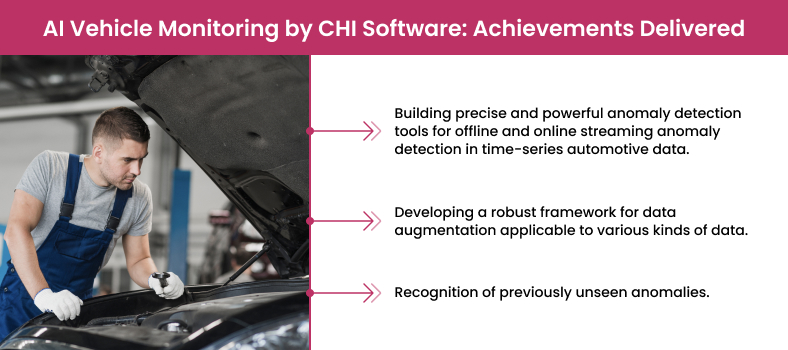
Fundamental project results
Our AI-powered car inspection solution can:
- Monitor the overall condition of the vehicle;
- Process real-time data;
- Detect unwanted breakdowns across multiple customer datasets and machine protection systems;
- Monitor the condition of all parts of the vehicle both online and offline;
- Provide automatic data augmentation.
A distinctive feature of our product is the ability to work not only in the cloud, but also on board vehicles in real time, helping to quickly predict when a vehicle’s health condition may lead to a breakdown – even from a distance.
We are constantly working to improve this project by following trends and changes in the world of AI.
AI App Development Cost: Navigating the Economic Landscape of Artificial Intelligence
Read more
Vehicle Hail Scanning System
Another CHI Software’s AI-driven car inspection solution is a vehicle hail scanning system. Our client in the Netherlands needed software that would eliminate the need for manual inspection, provide accurate hail damage counts with an accuracy of 80 per cent or higher, and reduce processing time.
As hail damage is significant but small, manual inspection takes a long time. As a result, customers had to wait for a significant amount of time to fully assess the vehicle’s condition, making the traditional approach highly inconvenient.
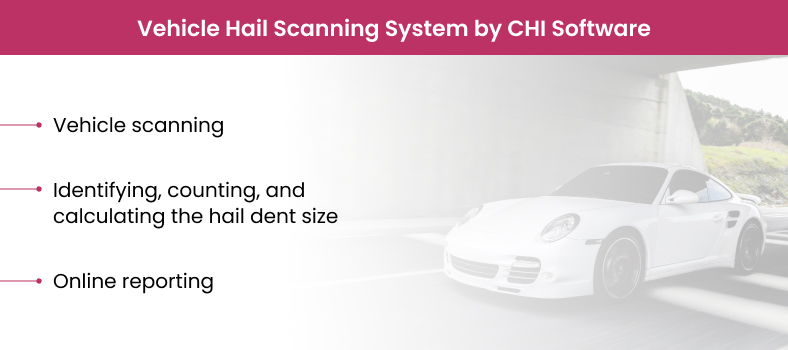
The three-step workflow of vehicle scanning with AI algorithms
The solution provided by the CHI Software development team can detect the slightest damage caused by hail in about a minute without human intervention.
Now, AI vehicle inspections work like this:
- A vehicle passes through a light tunnel equipped with optical cameras;
- High-resolution cameras and software identify each dent and generate a report based on the level of damage to the vehicle;
- The scanned data on the vehicle’s condition is stored in a secure cloud server.
Do you want to build something like this or even better? Just tell us what solution you have in mind.
Fill in this form
Glimpse into the Future of AI for Vehicle Inspections
Earlier, we described AI trends and their impact on business. But we believe that automated vehicle inspection has not yet reached the limit of its development. So let’s take a look at the revolutionary application of AI in automated car inspections and try to predict tech advancements.
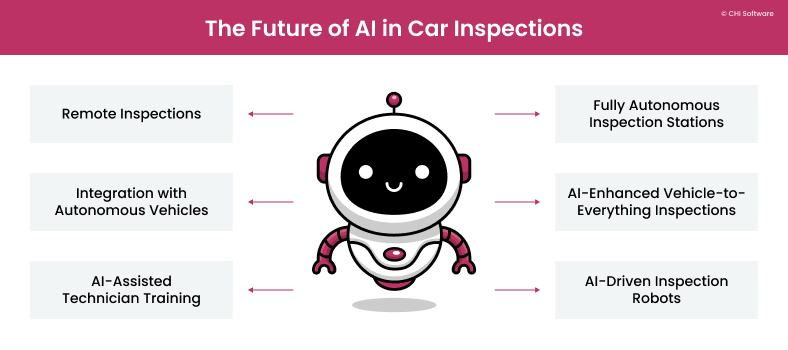
We believe these AI implementations can change car checks quite soon.
Remote Inspections
Remote inspections may be possible through mobile apps or other devices connected to the car. This development could save time and resources in cases where it is impossible or inconvenient to get to a physical inspection center.
Integration with Autonomous Vehicles
We believe that AI for vehicle inspections should become more accessible. Systems could automatically monitor the condition of individual vehicles. Such control would ensure adequate supervision of the machine’s optimal condition. Moreover, this complex analysis process would not require as many personnel to perform manual inspections.
AI-Assisted Technician Training
AI can help train technicians. Specific programs could create virtual simulations of various scenarios and guide professionals through complex diagnostics and repairs to improve the skills of technicians and simplify the decision-making process.
Beyond Conversations: Exploring ChatGPT Capabilities in Business
Read more
Fully Autonomous Inspection Stations
Fully autonomous vehicle scan stations are designed to perform vehicle check-ups without human intervention. The stations can provide services around the clock and potentially much faster than human technicians.
AI-Enhanced Vehicle-to-Everything (V2X) Inspections
V2X inspections involve vehicles interacting with control systems and infrastructure using V2X technology. This is a considerable contribution to road safety. In addition to continuously monitoring vehicles’ condition, AI is also being integrated into intelligent road infrastructure, ensuring that all cars operate within the proper range on the road.
AI-Driven Inspection Robots
AI-driven robots can perform detailed vehicle inspections in various environments, such as production lines, service centers, and even the road. At the same time, they guarantee a comprehensive examination thanks to a large number of built-in sensors and cameras.
We have a detailed answer if you have an idea but don’t know how to build an AI app. Follow our tips, and the development process will be much more enjoyable.
Conclusion
Artificial intelligence certainly has many advantages in the field of automated car inspections. We were pleased to demonstrate these benefits and show the process of developing such systems using our own examples.
CHI Software’s team is confident that digital vehicle inspection will become even more widespread in the future due to the extraordinary opportunities this innovation opens up. So, we are looking forward to developing a wide variety of projects related to vehicle inspection. If you have any ideas, don’t hesitate to get in touch – we’ll be happy to advise you.
FAQs
-
What types of car inspection tasks can be automated using AI?

Modern cars are very complex systems, but AI vehicle inspections are already capable of performing:
- visual damage detection;
- tire condition analysis;
- predictive maintenance;
- inspection report automations;
- interior condition assessment;
- post-collision analysis;
- automated pre-delivery inspections;
- used car certification;
- exhaust system inspection.
-
Is implementing AI in car inspections cost-effective for businesses?

Absolutely! AIi in automated car inspections is a cost-effective solution for businesses, especially in the long run.
The initial investment to implement artificial intelligence can be significant, but it is highly likely to be offset by long-term labor savings, reduced inspection times, and the prevention of costly repairs due to early detection of problems.
-
Can AI-powered car inspections be integrated with existing automotive technologies?

Yes, of course. You can integrate AI into your business system at any stage of its development. By combining artificial intelligence and existing automotive technologies, you can create a more seamless, efficient, and comprehensive vehicle inspection system.
-
Can AI detect all types of vehicle damage, including internal issues?

Yes, it can. For example, AI vehicle inspections help to diagnose the engine, battery condition, brake, and transmission problems. AI can not only see existing internal problems but also provide information on potential breakdowns inside the car.
-
What industries benefit the most from AI-powered car inspections?

In fact, any machine-related business can benefit from such an innovation, but here is a small list of the areas that will benefit the most:
- Insurance: AI can automate the process of verifying insurance claims by quickly assessing the damage to a vehicle after an accident;
- Logistics and transportation require constant confidence in the reliability of vehicles, so AI can help transportation companies comply with safety regulations by automatically checking vehicles;
- Used car market: AI car inspections provide an accurate assessment of used cars, which helps both buyers and sellers;
- Car repair shops: AI is streamlining the diagnostic process in car repair shops, allowing technicians to make more efficient decisions about vehicle repairs.
In addition, emergency services, automotive dealerships, car rental and leasing also benefit from using AI-powered car inspections.
About the author
Alex is a Data Scientist & ML Engineer with an NLP specialization. He is passionate about AI-related technologies, fond of science, and participated in many international scientific conferences.
Rate this article
25 ratings, average: 4.52 out of 5








